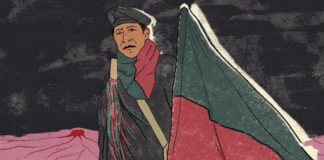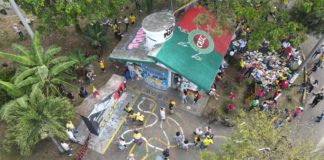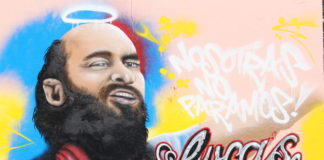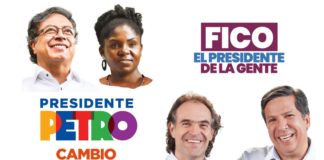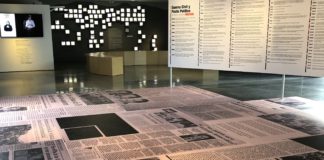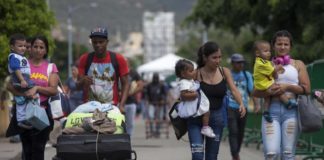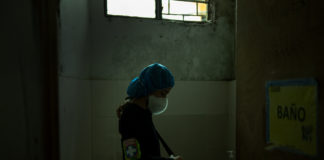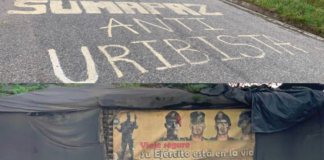Colombia: Indigenous Guard’s murder was premeditated
Following the murder of Colombian Indigenous leader Albeiro Camayo Güetio in January 2022 by FARC dissidents, independent digital media outlet 070 interview a human rights activist and a researcher at Conflict Responses Foundation to understand the crime and the government’s and FARC dissidents’ responsibility for it.
Colombia: Cali’s community libraries
In summer 2021, a three-month national strike against Ivan Duque's right-wing government proved a remarkable time for movement-building and social change. Silvia reports on the libraries constructed by and for local communities in Cali during this period.
Colombia: London mural honours Lucas Villa
A mural by street artist Kapo in London’s Stockwell Hall of Fame was painted in honour of one of the many protestors killed in Colombia during the national strike of 2021.
Colombian elections 2022: Petro or Fico? 
Colombia’s presidential elections are just around the corner (with a second round in June if no candidate obtains more than 50 per cent of the vote). Jorge Luis Rodriguez, a graduate from Bogota’s Los Andes university, takes a closer look at the two main candidates and what’s at stake for Colombians.
Colombia: I resist, therefore I exist
‘Resisto, luego existo’, the new exhibition at Bogota’s Centro de Memoria, Paz y Reconciliacion opens to the public with documentaries about centres of resistance around the country.
Mining: democracy comes from the street
Protests at Chubut in Argentina highlight the importance of pressure from the streets to force local officials to hold the line against destructive mine development. In Brazil, meanwhile, it is the trans-Brazil FIOL railway project that is mobilising communities to defend their land and livelihoods.
Does Colombia’s migration policy work for Venezuelans?
Around 2,000 Venezuelans per day are now migrating to Colombia, mostly using 'informal' crossing points. Colombia's policy of economic integration has benefited some, but now faces growing hostility towards the newcomers
Voz II | Saving Lives in Secret: The Medical Mission of...
When anti-government protests erupted in Colombia in April, the neighbourhood of Siloé in Cali quickly became an epicentre of resistance. Our guest writer, Jahfrann, was there with the medical mission "ESCONDIDA". He describes a nightmarish scene in which the instinct to preserve life is driven underground by state repression.
Notes from Colombia
Colombia’s security forces are in retreat. Human rights defenders are in bad shape. These are desperate times in the country. WOLA's Adam Isacson returns from his first visit to Colombia in nearly two years. Here are his reactions.
Stepping softly on the earth
A new film from Marcos Colón interviews indigenous leaders from across the Amazon whose thinking could transform our world as modern extraction and exploitation tip us further towards chaos and the destruction of the planet

